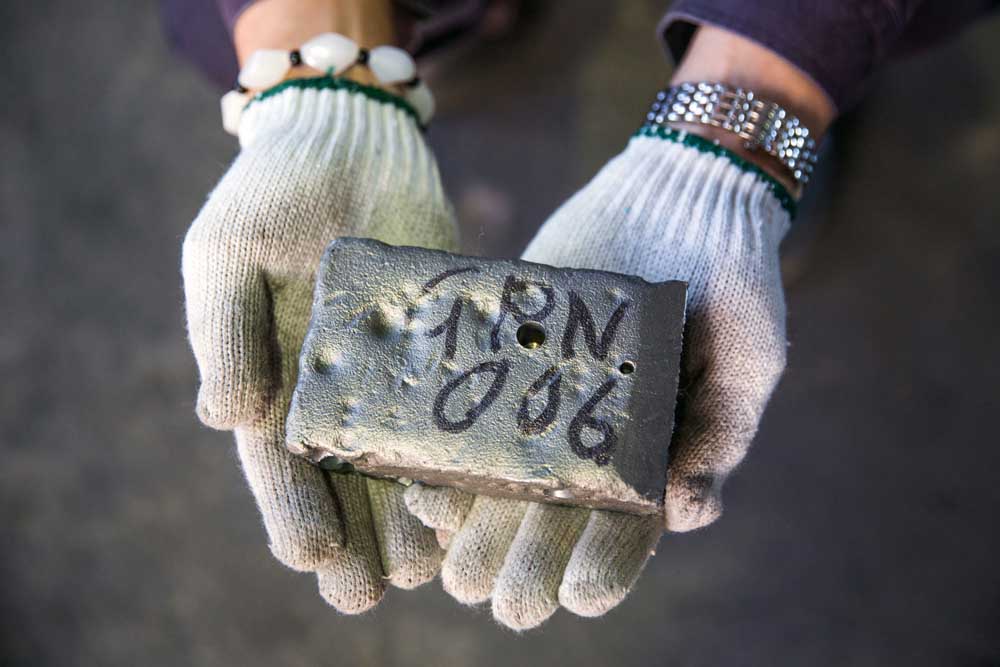Rare earths as trade war weaponry
Published 2:34 pm Saturday, May 25, 2019

- A worker holds an ingot of a rare earth metal used to make components for technology products at a factory in Tianjin, China. China dominates production of the rare earths used in myriad technologies, but tangled global supply chains make it hard to hit the U.S. directly. (Sim Chi Yin/The New York Times)
SHANGHAI — President Xi Jinping of China strode last week through a high-ceilinged factory that makes magnets out of rare earths, minerals that are essential to global manufacturing and a sector that his country dominates. His top trade negotiator, Vice Premier Liu He, stood near.
Xi did not threaten to block supplies of rare earths to the United States. He didn’t have to. The veiled threat, broadcast over state-run news media as President Donald Trump ratcheted up his trade war against Beijing, was clear.
China’s command of the rare-earth market could give Beijing a way to strike back at Trump as he raises tariffs and deprives Chinese companies of the technology they need to survive. A similar move by China nine years ago, against Japan over a territorial dispute, shocked manufacturers around the world, sent prices soaring and revealed Beijing’s control of an essential part of the global supply chain.
This time, however, the impact of any block on rare earths may be far less clear-cut. It could undermine China’s reputation as a manufacturing hub. Other trading partners, notably Japan and South Korea, could become collateral damage. And in an odd turnabout, China’s own needs have made it somewhat dependent on ore from the United States.
While China is determined to resist American pressure, limits on rare earths “will affect many other countries,” said Gary Liu, a Shanghai-based economist. “The global supply chain is so complicated.”
It is far from clear that China will harness rare earths as a weapon. On Wednesday, a spokesman for the Chinese Foreign Ministry advised reporters not to read too much into Xi’s visit Monday to the magnet factory in Jiangxi province. Hours later, Hu Xijin, the editor of Global Times, a tabloid owned by the Chinese Communist Party, said leaders in Beijing were considering the idea.
“I think Chinese government won’t do this immediately,” Hu wrote on Twitter, “but it’s seriously evaluating the need to do so.”
Rare earths are not actually rare. But refining them from ore is expensive and polluting. China has been one of the few countries willing to tolerate the industry. Though rare-earth mines have opened in the U.S., Australia and elsewhere, China dominates refining and transforming them into valuable metals, magnetic powders and other high-value products.
The minerals wind up in everything from iPhones to wind turbines and missiles. They are used to polish camera lenses and to refine crude oil into gasoline, diesel and jet fuel.
The appetite in the United States for products that include rare earths is enormous. But while the country still imports large quantities of cheap rare-earth catalysts for use in oil refineries, American demand for raw rare-earth metals to be used in factories has almost disappeared. Chinese customs data show the United States bought only 3.8% of China’s exports of rare-earth metals last year, far less than Japan, and also less than India, Italy or Spain.
In large part, that is because so much manufacturing has shifted out of the United States. Nearly a decade ago, Beijing began putting heavy pressure on manufacturers of products like electric motor magnets and light-emitting diodes to move factories to China if they wanted reliable access to rare-earth metals. Remaining U.S. industries like automaking and aerospace manufacturing now import entire systems from China, such as car starters and aircraft wing flaps.
Beijing could still block exports of Chinese-made motors, magnets and other gear to the United States — and industry experts noted Xi’s visit was to a magnet factory, not to a mine.
“The message was, this is a supply chain and we control your supply chain,” said Clint Cox, president of the Anchor House, a rare-earths consulting firm in Evanston, Illinois.
The dilemma for Beijing lies in whether to jeopardize its central role in global supply chains by halting exports of crucial components to the West. Trade hawks in the Trump administration have been expressing hope China will do just that. They see such an interruption as the best way to persuade companies to shift manufacturing out of China to the U.S. or its allies.






